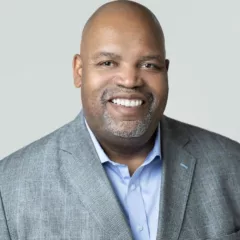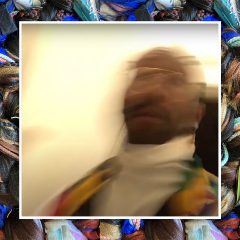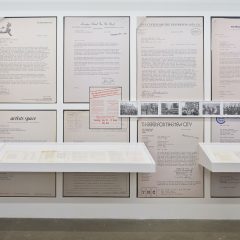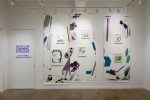[Evan attended a pre-recorded “talk” at the New Yorker Festival between Evan Osnos and Ai Weiwei. The artist spoke on living in limbo between freedom and imprisonment, and his hopes for a freer China one day. — the Artblog editors]
Chinese multimedia artist Ai Weiwei has made headlines around the world for his provocative and unyielding works since he burst onto the American art world’s radar after coming to New York City in 1981. The international man of intrigue and controversy has been deified by some and demonized by others; he has become a centerpiece for debate on the ever precariously balanced culture of control and censorship in his native China, his art and activism sometimes called indistinguishable. I had the pleasure of attending a talk with Ai Weiwei and New Yorker correspondent Evan Osnos at this year’s New Yorker Festival, a gathering of the most relevant creatives and luminaries descending on the SVA Theatre in Chelsea for a series of discussions, interviews, and presentations.
The effects of isolation
As you know, if you are familiar with Ai Weiwei’s turbulent trajectory in life thus far, the artist is confined to his home country and has been since his release from an 81-day detention in 2011 for “tax evasion”. Awaiting the return of his passport (which has been promised to him for three years and has yet to be delivered), Ai spoke with Osnos via Skype. Though the event was originally advertised as being a live video chat, I arrived at the festival to find that the interview had in fact been changed to be pre-recorded at the artist’s request–the Chinese government’s policies of omniscient surveillance are acutely focused on Ai, and he realizes that any provocation can harm his chances of ending his already fragile “soft detention,” as he calls it.
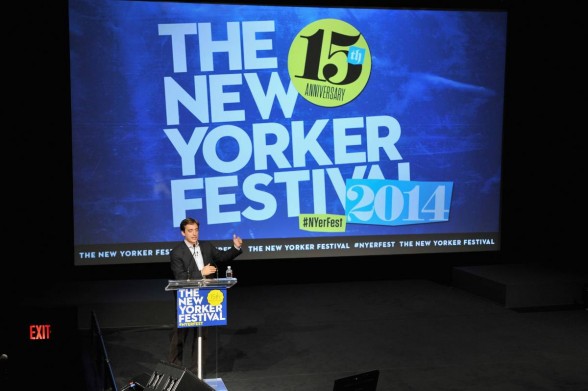
Speaking before and immediately following the pre-recorded interview, Mr. Osnos first offered an introduction of Ai, as well as a reminder of their personal connection (the two have spoken frequently over the years), and in conclusion, took questions about the video and offered his insights, notably: “I shouldn’t have made the poor guy speak so much English!” Mr. Osnos has worked as the New Yorker’s Beijing correspondent for many years, and his in-depth knowledge of the intricacies of Chinese culture and bureaucracy proved a valuable guiding light.
Ai went so far as to describe his invisible captors as “patient and considerate,” admitting that the one thing they wish he would not do was exactly what he was doing–appearing at a Western festival and encouraging Western thought from China. “Not knowing why is powerful,” he said in relation to his missing passport, echoing a common form of authoritarian control through the withholding of information. “All pieces of information, no matter how small, can start a fire.”
Creativity in captivity
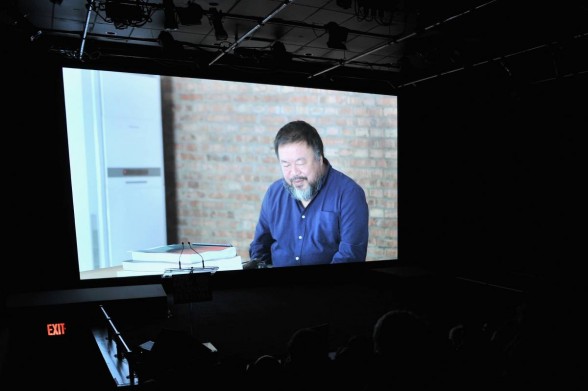
Hearing and seeing Ai Weiwei–almost live and almost in person–is an ironically fitting state of being for a discussion on confinement and isolation of persons in the business of expression and activism. His most recent endeavor, an exhibition that is a meditation on isolation and confinement and housed appropriately in the infamous prison at Alcatraz, drew international attention not just because of its location, but because of the absence of the artist. Once the show comes down, Ai will have been physically absent for the entire process of production, organization, presentation, and removal.
One of the more poignant sections of the show is his portraits of various political prisoners and dissenters, made from thousands and thousands of brightly colored Lego blocks–the child’s toy that he described as “very abstract, perfect even for Van Gogh or Rembrandt”–which give a voice to those who have been silenced. This remark on the old masters may have been more a joke than anything, but it is interesting to think about how those men would have viewed the rudimentary child’s toy, as loose Legos function so similarly to paint on the palette–only the hand that applies it makes it worthy of millions. There is a connection between the basic, instinctual invitation to play, which Legos evoke (the use of imagination to create something out of nothing), that echoes of the struggles of those confined to imprisonment. With all possessions and freedoms denied, these great minds must continue to churn and spin, using their own versions of Legos–what must feel like infinite time and lack of distraction–to keep creatively functioning.
Alongside his Lego portraits, notable pieces at Alcatraz include an array of traditional Chinese dragon kites, each made in collaboration with other Chinese artist,s and many holding patterns coming from countries with habits of restricting the freedoms of their inhabitants. The obvious metaphor here is that of flight, or escape, from lowly chains that limit lofty ambitions from taking off. The influence of tradition is pervasive in much of Ai’s work, suggesting that it should act as a springboard rather than a noose.
Ai’s odd living situation gives him the ability to recognize those of his kind who have not been so fortunate (fortune is relative in this case) and remain vigilant–guiding light to their causes by the very act of staying alive. He calls himself a “remote-control artist,” and a glimmer of his undying optimism and humor shines through.
This highlights an immediate contradiction of Mr. Wei Wei’s condition–why, for all of its power and control, is the Chinese government choosing to keep him in limbo, neither free nor confined, unable to physically leave, yet able to make art and remain active abroad virtually? They could undeniably silence him if they wanted to, as the notion that he was “untouchable” because of his foreign fame was quashed upon his 81-day internment and interrogation. What has happened here, said Mr. Osnos, is the Chinese authorities’ profound lack of precedent to deal with someone like Ai Wei Wei. They are flabbergasted, dumbfounded by a man so relentless in his beliefs, ideologies, and actions, yet never actually doing anything strictly illegal (not to mention his practically palpable international following, both public and political). They have contradicted themselves by imprisoning him, yet leaving him free, and there is even speculation of a rift in higher administration as to how to handle him properly. Looked at in a certain light, this is a small victory for Ai. If you can’t beat them, at least you can confuse them–make them think about their actions.
Relationship to his home country and the U.S.
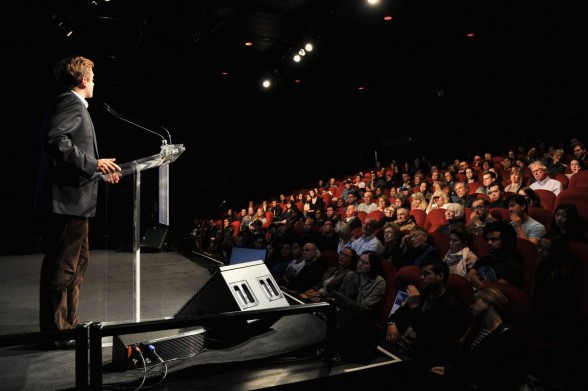
Ai has an odd relationship with the Chinese population at home as well. The offspring of one of the most famous poets of the revolutionary era, he is generally considered a privileged son. His father was eventually persecuted for his beliefs and sent off to live in labor camps in the remote western reaches of the country, and when his father’s health took a turn for the worse, it prompted Ai’s return to China in 1993. Ironically, Ai said, “…[I]n my own detention, I realized I didn’t really know my father…I took too much for granted.” When asked whether he thought he would have made different work had he grown up in the West, he said, “It is a completely different problem in a democratic society…you can feel small and anonymous, but still a part of society rather than a foreigner in it.” He spoke favorably of his time living in New York, where he became friends with Allen Ginsberg and integrated himself with the arts, along with working odd jobs and becoming one of the most feared and respected blackjack players in Atlantic City.
Despite his exploits and newfound freedoms during his time in the West, the artist still feels “profoundly Chinese”. “This is my country,” he said, “and I would die for it.” He admitted with great sadness, however, that he would rather his son grow up overseas than at home given China’s current cultural climate.
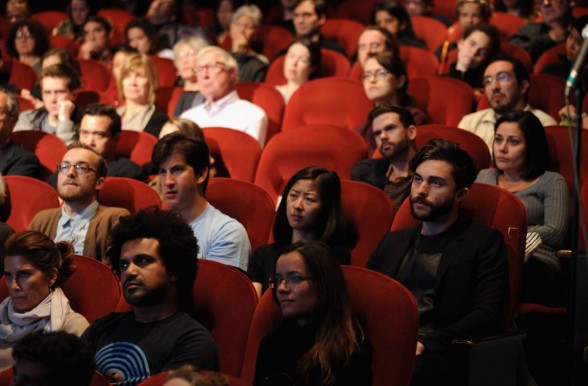
Ai is not nearly as famous in his own country, and I wonder where the lines of fear and indifference cross for older and younger generations. When asked about this, and his relationship with other Chinese artists who ignore politics or move away, he seemed a little bit sad. He said that artists in China “cannot avoid politics…we are not so privileged. Confrontation with me by other artists is unavoidable.” However, “It’s no big deal,” he said with a shrug. His people, he admitted, are “intentionally trying to forget the past” and that this situation “turns into a disaster for future generations.” He describes his people as “acting out of loyalty and principle and lacking ties to information. Their jobs are drugs, prescribed so you act a certain way.”
The policy of censorship at home is so successful that it damages the very foundations of Chinese society. In relation to the revolution, Ai remarked, “After 64 years of playing chess, they never let you finish the game.” I find it remarkable how Ai takes the high road in relation to his captors. He has made a significant amount of work about his guards and interrogators, and how he actually feels that they are under the same kind of internment as he is; they just don’t realize it. He remains silent about the higher-ups, and we can assume that he does not feel so sympathetic toward those who ordered his capture as to the hands that carried it out.
Ai’s empathy and perseverance are not guided by fame or fortune, but by a genuine love for his country and fear for its future (with a little bit, or a lot, of adventurousness thrown in). When asked if he could learn to trust the Chinese government again, he paused. “Every morning, when the sun comes up, I trust again,” he said. For a Westerner, this undying faith may seem astounding, considering what he has suffered at the hands of his country. We know what we consider to be freedom, and are not constantly confronted with having to define exactly what it is or who will pay for it. At age 57, Ai Wei Wei continues to attempt to unlatch the minds of the youth who surround him in hopes of a brighter future, so that one day, it could be possible for his son to raise his child in a free China. “There is so much more to do,” he yearned, “but so little time left.”


